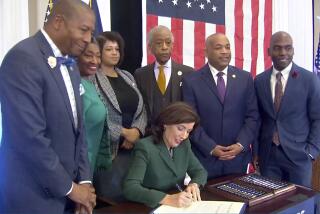Bill OKd to Assess Impact of Legal Gambling
- Share via
WASHINGTON — Ending a divisive political battle, the House voted Monday to commission a comprehensive federal study to assess the effects of the rapid spread of legal gambling across the nation.
The study, approved by voice vote, is intended to address one of the fundamental questions posed by the proliferation of gaming: Are the financial benefits realized by states, communities and businesses outweighed by damage done to problem gamblers, their families and society?
The legislation now goes to President Clinton, who is expected to sign it.
In what was viewed as a key compromise assuring passage, the measure would grant the congressional commission limited authority to subpoena records and documents from casino operators. But it would not be allowed to subpoena witnesses.
Under provisions of the legislation, the president, the speaker of the House and the Senate majority leader would each appoint three persons to the nine-member commission, which would be created within 60 days of the bill’s signing by Clinton.
The commission would be given two years to investigate and prepare a report assessing the industry’s ties to organized crime, the impact of political contributions on the spread of legal gambling, the demographics of gamblers and the need for greater enforcement of laws that bar illegal gaming.
Alarmed by the rapid expansion of legal gaming, which has soared from a $17-billion industry in 1974 to $482 billion in 1994, anti-gambling crusaders mounted a nationwide campaign to authorize the commission.
Bernie Horn, political director for the National Coalition Against Legalized Gambling, a Washington-based anti-gambling group, said the commission is needed to give activists accurate information to use in their efforts to limit further casino and lottery growth.
“The commission is necessary to get information to the public about the activities and practices of the gambling industry,” Horn said. “There has never been an accurate look into their business. It is long overdue.”
Last March, the House passed a version of the bill that would have given the commission broader power to collect industry records and compel casino operators to divulge information that anti-gambling activists believed would demonstrate that the industry targets compulsive gamblers and the poor.
That bill languished for months in the Senate, where influential lawmakers tried to kill it in committee and, later, prevented it from coming to a floor vote.
Last week, after the bill’s proponents agreed on a compromise eliminating the commission’s ability to subpoena casino operators, Senate Majority Leader Trent Lott (R-Miss.) permitted the floor vote. It passed by unanimous consent.
Confronted by the aggressive tactics of grass-roots activists and local politicians who oppose gambling in their communities, the American Gaming Assn., a consortium of gaming concerns, organized itself to lobby Washington’s lawmakers on behalf of the industry.
The fight over the commission was the first test of the group’s emerging clout, which is reflected in the millions of dollars in campaign contributions to key political figures and organizations. The Gaming Assn. has given lavish parties and cash donations to both President Clinton and Republican presidential candidate Bob Dole.
Initially, officials of the organization argued against creation of the commission. Faced with growing public sentiment in support of the study, however, the gaming lobby shifted strategies and prevailed on congressional leaders to soften the original House bill.
More to Read
Sign up for Essential California
The most important California stories and recommendations in your inbox every morning.
You may occasionally receive promotional content from the Los Angeles Times.













